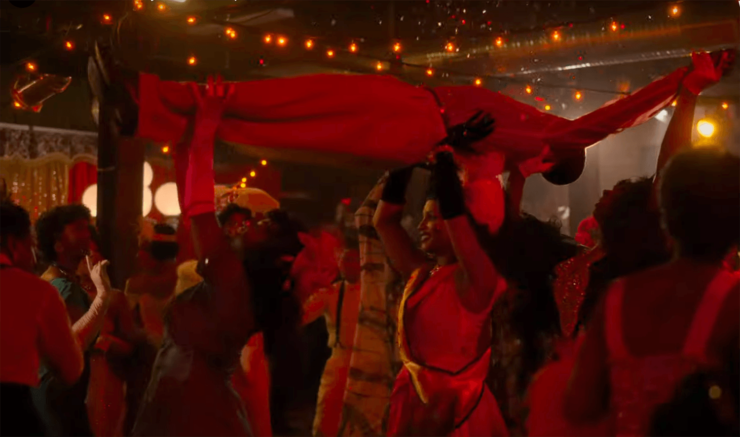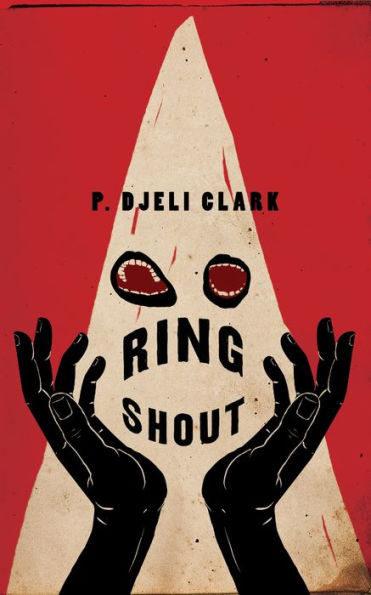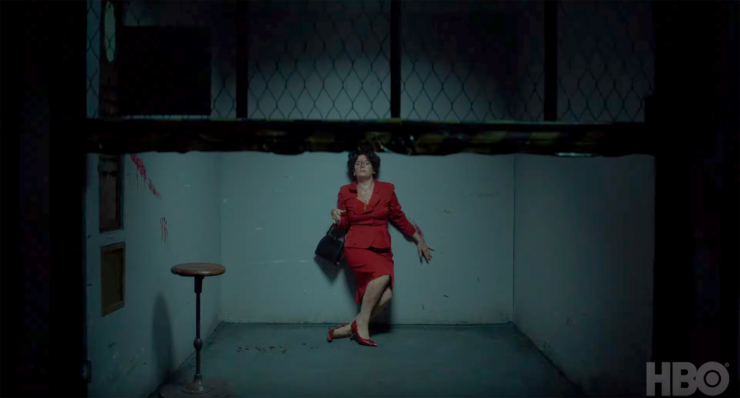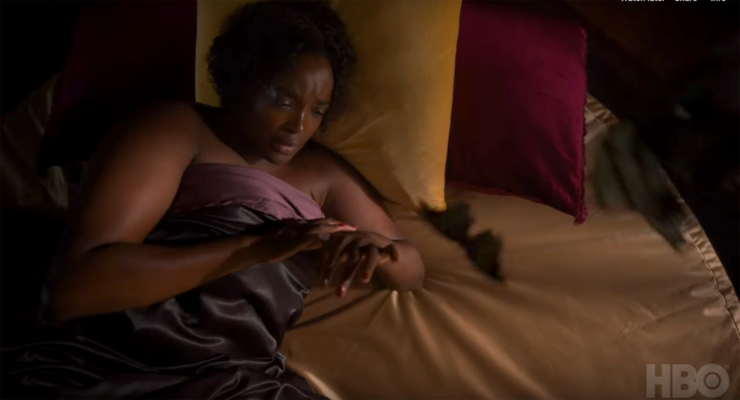And we’re back with the fifth episode of Lovecraft Country, featuring crisis, metamorphosis, and catharsis.
Although this episode revolves largely around Ruby (and by proxy William), Tic, Montrose, and Ruby all get life-altering moments. All three are already at their breaking points when the episode opens. Montrose is riddled with self-loathing over killing Yahima. Tic is desperate to stop Christina before she strikes again. Ruby lost everything she’d been working toward for years. Leti already had her arc of crisis to metamorphosis to catharsis and I expect Hippolyta’s is still to come, so we’ll set them aside for now.
Atticus
Tic explodes when his father tells him and Leti that Yahima left. He sees the truth written on Montrose’s bloody fingernails. A rage takes hold and his fists fly, nearly beating his own father to death. From Tic’s perspective, everything is lost. Yahima was the key to the language of Adam and he was going to unleash her like a nuclear bomb on the Order. Now he has nothing, or so he thinks. Luckily for him, Leti took photos of the pages before Montrose destroyed them.
Sexy times in George’s garage bring Tic and Leti closer together and help him let go (at least for the time being) of his frightening temper. It’s the step he needs to make a change. When Leti sees him again, he’s in her basement poring over the photos of the lost pages. He is as obsessed as his father was over Dora’s ancestry and as Titus and Samuel Braithwaite were over opening the Gates to Creation. Tic makes the case that the language of Adam isn’t inherently bad, that it can be a tool as much as a weapon. He will do anything to protect the people he cares about, including lying to himself to make the means justify the end. You can beat your child if it makes them tougher. You can kill people as long as it’s war. You can hurt and abuse and terrorize as long as it’s in the name of self-preservation. “Protect ours. How can that be bad?” But Leti is more observant than he gives her credit for: “Look at what your father did to protect you.”
Catharsis comes with Leti in the bathtub up to her neck in bubbles and praying for Yahima’s soul. He confesses to her his relationship in Korea and she accepts him anyway. Both have had troubled examples on how to love, but the only way they can move forward is together.
Montrose

After the fight with his son, Montrose turns up at Sammy’s apartment for a little rough-and-tumble. It’s sweet yet heartbreaking as he lets go of the man he doesn’t want to be and tentatively steps into a new life.
The South Side queer bar is where Montrose receives his catharsis. While Sammy is decked out in dramatic makeup and a stunning dress, Montrose is stripped bare in a somewhat sheer shirt. This is the most open and relaxed we’ve ever seen him. He has no armor now. It’s a powerful realization that it was in a drag bar with his male lover that he decided to lay down his sword and shield, even if only temporarily. He cannot be his true self to his family or friends, yet these people see him for who he really is and do so without question or judgement.
Montrose cannot be truly intimate despite his desire. Like Tic, his love is intertwined with violence. And like Leti, Sammy accepts it because right now the good times outweigh the bad. But their relationships are fleeting. Tic has made no long-term plans with Leti, and Montrose will never settle down with Sammy. Theirs are romances built on unfulfilled dreams and lies they tell themselves. Leti is innocent enough to hope she can keep Tic while Sammy is grateful just to finally get his kiss.
Ruby
Ruby wakes up wearing Dell’s thin white body. She escapes William’s mansion and makes it all the way to the South Side where she bumps into a Black boy and gets her first taste of the tenuous power of white womanhood. The white cops nearly beat the boy to defend Ruby-as-Dell’s virtue, but she is able to assuage them with calm words and a pretty smile. However, once she’s in their car, whatever power she had vanishes like dust in the wind. She is reduced to a hysterical housewife who needs her strong husband. As Samuel Braithwaite said in episode two, “From God to man to woman down to the lowliest wriggling creature.”
Buy the Book


Ring Shout
After Ruby sheds her white skin in a bloody scene, William sets the hook and she blusters right into it. He offers her a deal: use the potion as often as she wants in exchange for some occasional espionage. Clearly she didn’t learn the right lesson from what happened with the Black boy. Reveling in her newfound freedom, Ruby-as-Dell applies for a sales job at Marshall Fields and is gifted with an assistant manager role instead. She eagerly accepts…while trying not to turn back into her Black self.
Ruby settles into her whiteness a little too well. At the same time, she can’t quite shake the Blackness at her core. She approaches her conversations with Tamara as if they were speaking Black woman to Black woman, but as Tamara’s white superior, her tone feels like a presumption, an invasion, a threat. What would be “we need to work twice as hard to get half as far” between Ruby and Tamara instead comes off from Ruby-as-Dell as, to borrow the words from one of the white sales girls, “Of course she’s unqualified. She’s a negro.”
But there’s something deeper at work here, too. Ruby doesn’t want Tamara just to be her best, but to do everything in her power to meet the impossible standards of white people. Ruby buys into the philosophy of Black exceptionalism, believing that if she is educated, articulate, and dignified she can earn white people’s respect. Black exceptionalism frames success as adjacent to whiteness. It shifts the trauma of white supremacy onto Black people who cannot claw their way out of poverty or afford to attend school. As if they are at fault for their problems instead of systemic oppression. As the token Black person, Tamara is trapped in a rigged system where she now represents all Black people. Any misstep or failing makes them all look bad. What Ruby doesn’t understand is that the reverse isn’t true; Tamara’s successes will not make all Black people look good. White supremacy doesn’t work like that.
During a break in the stockroom, Ruby-as-Dell shares a moment of camaraderie with her white underlings, but it’s shattered when the conversation veers into casual racism. It’s a sudden reminder that Ruby may look white but she’s still Black. That disappointment is compounded when William sends her to a fancy party hosted by Captain Lancaster and the Chicago lodge, not as a guest but as the help. Christina gives Ruby a spell-worked stone to hide in his office. She weaves Ruby a sob story about Lancaster shooting William in the back, and while I’m sure some of it is true, I doubt all of it is. She also fails to warn Ruby about the tortured man tied up in the closet.
Back in her increasingly comfortable white skin, Ruby-as-Dell strong-arms Tamara into taking them all to the South Side. At Denmark Vesey’s, Tamara feels like a zoo animal. She’s on display just like Tic, Leti, and George were for Samuel’s lodge. Ruby-as-Dell feels like shit as she watches the white women treat the Black men like toys.
They aren’t the only ones playing tourist. “Mister Manager” Hughes makes a move on Tamara in the alley behind the bar. He does it because he can. After all, who would believe her or even care? He’s her boss, he’s a man, and he’s white; he has all the power. By this point, Ruby has already transformed back to herself and is naked and covered in guts so she can’t intervene. Tamara rescues herself, but it will probably cost her her job. Not that she’d miss it that much. Her time at Marshall Fields began with white people quitting in protest, continued with constant racism and microaggressions, and culminated with sexual assault.
Disgusted by whiteness, Ruby wants to give up transformation, but Christina offers her catharsis (and deflects her question about what’s in the locked basement) by convincing her that magic isn’t about freedom but power. Magic lets you do whatever you want, seemingly without consequence. It’s a lie, and that arrogance will catch up with them all sooner rather than later, but the enticement is too strong. Ruby-as-Dell uses her new power to sexually assault Hughes, not as payback for Tamara but as an outlet for a lifetime of stifled rage.
While Christina is right that magic is power, she’s wrong in believing that power equals domination. When used right, power can uplift and protect. Sammy has power in drag. Leti has power when she rallies the ancestors to defeat Hiram. Hannah has power when she destroys Braithwaite lodge. Ruby’s act of power is short lived and puts no good into the world, only more violence. This is her slave revolt, and I fear it will be exactly as successful as Denmark Vesey’s.

Cultural texts referenced:
- West Africa suffered a devastating locust infestation in the late 1950s.
- The piece playing when Ruby-as-Dell enjoys her day as a white lady is from Ntozake Shange’s “for colored girls who have considered suicide / when the rainbow is enuf.” Premiering in 1976, the choreopoem contains 20 poems set and performed to music that tells the stories of seven Black women.
- Ruby sings “The Devil and the Deep Blue Sea” in the tub, originally performed by Cab Calloway in 1931.
- Sammy lives at the Cabrini-Green Homes in the Near North Side. The area was heavily impacted by crime (not least in part because the projects were intentionally developed as part of the Chicago Housing Authority’s segregation tactics). The movie Candyman, which is being remade by Lovecraft Country executive producer Jordan Peele, was also filmed there. The projects were demolished by 2011.
- Little Richard wrote and performed “Tutti Frutti.” The first time we hear the song, it’s on the radio when the white sales girls dance in the stockroom, but it’s the mayo-on-white-bread Pat Boone cover. The second time is the original version playing on the radio at Sammy’s pre-party—timely, as Little Richard’s original lyrics were explicitly about gay sex.
Final thoughts
- I wonder how much George and Dora knew about Montrose. Is that why he let go of Dora, to protect his baby brother’s secret?
- If Ruby is wearing Dell’s (dead or unconscious) form, then who was William originally? He looks so much like Christina that it’s hard to imagine they weren’t related. And what is his tattoo for?
- This episode came so close to having conversations about passing and colorism.
- Posing Ruby and William under a homoerotic Wrigley’s gum ad is an…interesting choice. Lots of neon flashing lights about queerness this episode.
- Yep, I guessed right that Christina and William were one and the same. I wonder if she can transform on command?
- Will Ruby want to continue her relationship with Christina and/or Christina-as-William? Does Christina consider herself gay/queer or was Ruby just an item on her checklist? There was no reason to show her true face to Ruby. She could’ve easily given her the stone as William, but she chose to expose herself…
- Could Christina’s potion and Lancaster’s grafting both be part of Hiram’s human experiments?
- Assuming the orrery functions similarly to how it does in the book, I’m not sure how it fits in with him being a mad scientist. Perhaps it was stolen from another Lodge member? That seems to be a habit of theirs.
- Lancaster mentioned the orrery and the observatory, so I’m guessing we’ll see both in Hippolyta and Dee’s upcoming story.
Alex Brown is a librarian by day, local historian by night, author and writer by passion, and an ace/aro Black woman all the time. Keep up with her on Twitter and Insta, or follow along with her reading adventures on her blog.










